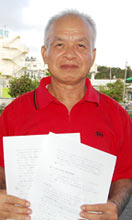Uchinaguchi grammar guidebook

Shinsho Miyara introduces his work-in-progress, the Uchinaguchi Grammar and Idioms Guidebook. In Kitanakagusuku Village on September 11.
September 12, 2013 Yoshiya Hokama of the Ryukyu Shimpo
Professor Emeritus of the University of the Ryukyus Shinsho Miyara, who does research and works to help spread Uchinaguchi (Okinawan dialect), has been working to create a book provisionally titled Uchinaguchi Grammar and Idiom Guidebook. He has already written 600 A-4 size pages and will publish the book next year after adding another 100 pages. Miyara said, “There is no book that compiles the necessary grammar and idioms for studying Uchinaguchi. We need to create a guidebook like this to help spread the language.”
The guidebook compiles idioms used in Naha and Shuri. Unlike standard dictionaries, this guidebook explains idioms for learners to understand easily by putting words into grammatical categories such as nouns, verbs, and adjectives with example sentences. The book also explains how Uchinaguchi works and introduces examples of conversational expressions to make it a practical grammar book for teachers and learners.
Miyara serves as the president of the Naha City Culture Association Uchinaguchi Division and as an adviser for NPO Okinawa Language Diffusion Council. He started making the guidebook five or six years ago. Because there is no fully-fledged guidebook covering the necessary information for the teaching and learning of Uchinaguchi Miyara decided to make one by himself.
He visited schools in Hawaii to look at Hawaiian language education, which has been revitalized in recent years. Miyara found that Hawaiian translations of English textbook were used as educational material in the higher grades while there were more simple educational materials for lower grades of elementary school. He said, “In Hawaii they also need to make a grammar book. I felt that I should do my bit to make a guidebook like this. I hope that it will be something that people use widely.”
(English translation by T&CT, Megumi Chibana and Mark Ealey)
Previous Article:Naha City creates booklets for Shimakutuba
Next Article:Film “Ryukyu through eyes of a Chinese envoy” wins Eibunren Award 2013
[Similar Articles]
- Uchinaguchi educational CD now available for sale
- English tourist guidebook on Okinawa published
- Naha City creates booklets for Shimakutuba
- Tokyo University of Foreign Studies debuts Okinawan Language course this fall
- Seventy people gather to discuss the establishment of an Okinawan Language Immersion School
 Webcam(Kokusai Street)
Webcam(Kokusai Street)


